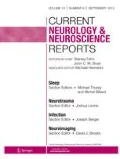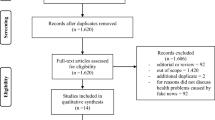Abstract
This article discusses the concept of illness-related stigma and its relevance to consideration of the psychosocial impact of epilepsy. It provides an overview of the recent literature on epilepsy-related stigma as it relates to the stigma experience of people with epilepsy themselves and to the beliefs and attitudes held by other key target groups. The limitations of these and previous studies are considered, and some advances in knowledge arising from them are highlighted. Finally, some suggestions are made about possible areas for further investigation.
Similar content being viewed by others
References and Recommended Reading
Goffman E: Stigma: Notes on the Management of Spoiled Identity. Upper Saddle River, NJ: Prentice Hall; 1963.
Gerhardt UE: Stress and stigma explanations of illness. In Stress and Stigma: Explanation and Evidence in the Sociology of Crime and Illness. Edited by Gerhardt UE, Wadsworth ME. London: Macmillan Press; 1985.
Samers M: Immigration, ‘ethnic minorities’, and ’social exclusion’ in the European Union: a critical perspective. Geoforum 1998, 29:123–144.
Kai J, Crosland A: Perspectives of people with enduring mental ill health from a community-based qualitative study. Br J Gen Practice 2001, 51:730–736.
Neuberg SL, Smith SM, Asher T: Why people stigmatize: toward a biocultural framework. In The Social Psychology of Stigma. Edited by Heatherton TF, Kleck RE, Hebl MR, Hull JG. New York: The Guilford Press; 2000:31–61.
Reidpath D, Chen K, Gifford S, Allotey P: He hath the French pox: stigma, social value and social exclusion. Sociology Health Illness 2005, 27:468–489.
Jones E, Farina A, Hastorf A, et al.: Social Stigma: The Psychology of Marked Relationships. New York: Freeman; 1984.
Crocker J, Major B, Steele C: Social stigma. In Handbook of Social Psychology. Edited by Fiske S, Gilbert D, Lindzey G. Boston: McGraw-Hill; 1998:504–553.
Temkin O: The Falling Sickness. Baltimore: John Hopkins Press; 1971.
Bagley C: Social prejudice and the adjustment of people with epilepsy. Epilepsia 1972, 13:33–45.
Scambler G: Epilepsy. London: Tavistock; 1989.
Jacoby A, Gorry J, Gamble C, Baker G: Public knowledge, private grief: a study of public attitudes to epilepsy in the UK and implications for stigma. Epilepsia 2004, 45:1405–1415.
Link G, Phelan J: Conceptualizing stigma. Am Rev Sociol 2001, 27:363–385.
Corrigan P, Watson A, Byrne P, Davis K: Mental illness stigma: problem of public health or social justice? Social Work 2005, 50:363–368.
Major B, O’Brien L: The social psychology of stigma. Annu Rev Psychol 2005, 56:393–421.
Kreiger N: Racial and gender discrimination: risk factors for high blood pressure? Social Sci Med 1990, 30:1273–1281.
Kreiger N: Racial discrimination and blood pressure: the CARDIA Study of young black and white adults. Am J Public Health 1996, 86:1370–1378.
Mays V, Cochran S: Mental health correlates of perceived discrimination among lesbian, gay, and bisexual adults in the United States. Am J Public Health 2001, 91:1869–1876.
Cree V, Kay H, Tisdall E, Wallace J: Listening to children and young people affected by parental HIV: findings from a Scottish study. AIDS Care 2006, 18:73–76.
Flowers P, Davis M, Hart G, et al.: Diagnosis and stigma and identity amongst HIV positive Black Africans living in the UK. Psychol Health 2006, 21:109–122.
Meinardi H, Scott RA, Reis R, Sander JW: The treatment gap in epilepsy: the current situation and ways forward. Epilepsia 2001, 42:136–149.
Jallon P, Zifkin BG: Seizure precipitants. In Epilepsy: A Comprehensive Textbook, edn 2. Edited by Engel J Jr, Pedley TA. Philadelphia: Lippincott Williams & Wilkins; 2008.
Finch B, Kolody B, Vega W: Perceived discrimination and depression among Mexican-origin adults in California. J Health Social Behav 2000, 41:295–313.
Harrell S: A multidimensional conceptualization of racism-related stress: implications for the well-being of people of color. Am J Orthopsychiatry 2000, 70:42–57.
Scambler G, Hopkins A: Generating a model of epileptic stigma: the role of qualitative analysis. Social Sci Med 1990, 30:1187–1194.
Jacoby A: Felt versus enacted stigma: a concept revisited. Social Sci Med 1994, 38:269–274.
Jacoby A, Baker GA, Steen N, et al.: The clinical course of epilepsy and its psychosocial correlates: findings from a UK community study. Epilepsia 1996, 37:148–161.
Baker GA, Brooks J, Buck D, et al.: The stigma of epilepsy: a European perspective. Epilepsia 2000, 41:98–104.
Muhlbauer S: Experience of stigma by families with mentally ill members. J Am Psychiatric Nurses Assoc 2002, 8:76–83.
Jacoby A, Austin JK: Social stigma for adults and children with epilepsy. Epilepsia 2007, 48(Suppl 9):6–9.
Jacoby A, Snape D, Baker GA: Epilepsy and social identity: the stigma of a chronic neurological disorder. Lancet Neurol 2005, 4:171–178.
Funderburk JA, McCormick BP, Austin JK: Does attitude toward epilepsy mediate the relationship between perceived stigma in children and mental health outcomes with epilepsy? Epilepsy Behav 2007, 11:71–76.
Austin JK, MacLeod J, Dunn DW, et al.: Measuring stigma in children with epilepsy and their parents: instrument development and testing. Epilepsy Behav 2004, 5:472–482.
Austin JK, Huberty TJ: Development of the child attitude toward illness scale. J Pediatr Psychol 1993, 18:476–480.
Rhodes PJ, Small NA, Ismail H, Wright JP: “What really annoys me is people take it like it’s a disability”: epilepsy, disability and identity among people of Pakistani origin living in the UK. Ethnicity & Health 2008, 13:1–21.
Ismail H, Wright J, Rhodes P, Small N: Religious beliefs about causes and treatment of epilepsy. Br J Gen Pract 2005, 55:26–31.
Birbeck G, Chomba E, Atadzhanov M, et al.: The social and economic impact of epilepsy in Zambia: a cross-sectional study. Lancet Neurol 2007, 6:39–44.
Santosh D, Kumar TS, Sarma PS, Radhakrishnan K: Women with onset of epilepsy prior to marriage: disclose or conceal? Epilepsia 2007, 48:1007–1010.
Allotey P, Reidpath D: Epilepsy, culture, identity and well being—a study of the social, cultural and environmental context of epilepsy in Cameroon. J Health Psychol 2007, 12:431–443.
Jacoby A, Wang W, Dang VT, et al.: Meanings of epilepsy in its sociocultural context and implications for stigma: findings from ethnographic studies in local communities in China and Vietnam. Epilepsy Behav 2008, 12:286–297.
Fernandes PT, Salgado PC, Noronha AL, et al.: Epilepsy stigma perception in an urban area of a limited-resource country. Epilepsy Behav 2007, 11:25–32.
Fernandes PT, Salgado PC, Noronha AL, et al.: Prejudice towards chronic diseases: comparison among epilepsy, AIDS and diabetes. Seizure 2007, 16:320–323.
Fernandes PT, Noronha AL, Araujo U, et al.: Teachers perception about epilepsy [Spanish]. Arq Neuropisquiatr 2007, 65(Suppl 1):28–34.
Reno BA, Fernandes PT, Sander JW, Li LM: Stigma and attitudes on epilepsy—a study with secondary school students [Spanish]. Arq Neuropisquiatr 2007, 65(Suppl 1):49–54.
Tran DS, Odermatt P, Singphuoangphet S, et al.: Epilepsy in Laos: knowledge, attitudes, and practices in the community. Epilepsy Behav 2007, 10:565–570.
Shafiq M, Tanwir M, Tariq A, et al.: Epilepsy: public knowledge and attitude in a slum area of Karachi, Pakistan. Seizure 2007, 16:330–337.
Demirci S, Donmez CM, Gundogar D, Baydar CL: Public awareness of, attitudes toward, and understanding of epilepsy in Isparta, Turkey. Epilepsy Behav 2007, 11:427–433.
Chomba EN, Haworth A, Atadzhanov M, et al.: Zambian health care workers’ knowledge, attitudes, beliefs and practices regarding epilepsy. Epilepsy Behav 2007, 10:111–119.
Birbeck GL, Chomba E: Zambian teachers: what do they know about epilepsy and how can we work with them to decrease stigma? Epilepsy Behav 2006, 9:275–280.
Atadzhanov M, Chomba E, Haworth A, et al.: Knowledge, attitudes, behaviors, and practices regarding epilepsy in Zambian clerics. Epilepsy Behav 2006, 9:83–88.
Mbewe E, Haworth A, Atadzhanov M, et al.: Epilepsy-related knowledge, attitudes, and practices among Zambian police officers. Epilepsy Behav 2007, 10:456–462.
McColl E, Jacoby A, Thomas L, et al.: Design and use of questionnaires: a review of best practice applicable to surveys of health service staff and patients. Health Technol Assess 2001, 5:1–256.
Collins KT, Camfield PR, Camfield CS: People with epilepsy are often perceived as violent. Epilepsy Behav 2007, 10:69–76.
Caveness WF, Gallup GH: A survey of public attitudes towards epilepsy in 1979 with an indication of trends over the past thirty years. Epilepsia 1980, 21:509–518.
Reis R, Meinardi H: ILAE/WHO “Out of the Shadows Campaign” stigma: does the flag identify the cargo? Epilepsy Behav 2002, 3:S33–S37.
Paschal AM, Hawley SR, Romain TS, et al.: Epilepsy patients’ perceptions about stigma, education, and awareness: preliminary responses based on a community participatory approach. Epilepsy Behav 2007, 11:329–337.
Author information
Authors and Affiliations
Corresponding author
Rights and permissions
About this article
Cite this article
Jacoby, A. Epilepsy and stigma: An update and critical review. Curr Neurol Neurosci Rep 8, 339–344 (2008). https://doi.org/10.1007/s11910-008-0052-8
Published:
Issue Date:
DOI: https://doi.org/10.1007/s11910-008-0052-8




